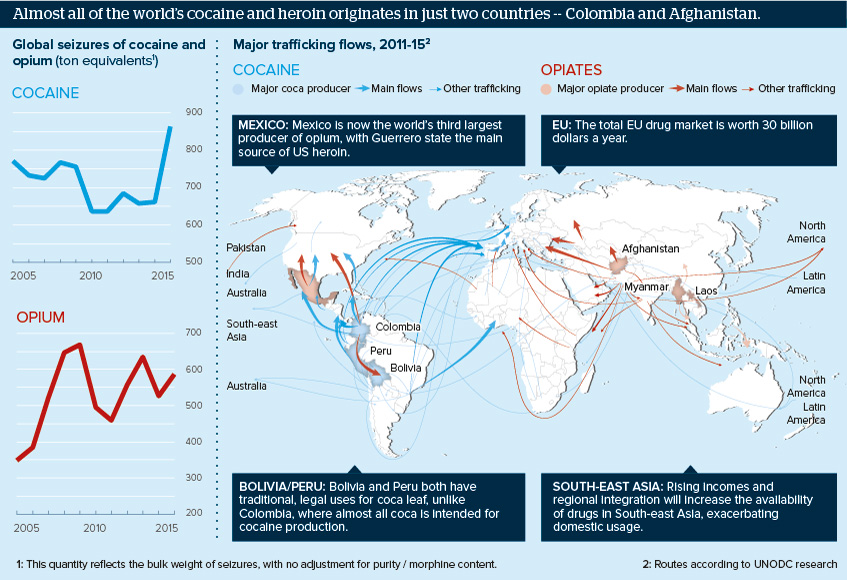Crop eradication will not root out drug crime
Despite years of efforts to destroy illicit drug crops, cultivation of coca and opium poppy is soaring to record levels
Source: UNODC, Europol
Outlook
The fragile security dynamics surrounding Colombia’s peace processes require Bogota to take a softly-softly approach towards coca reduction that risks setting it at odds with Washington. Threats by US President Donald Trump to slash aid to Colombia if it does not curb production could have grave consequences for Colombian peacebuilding, particularly if a presidential candidate sympathetic to Trump’s stance is elected in May.
The US troop drawdown in Afghanistan has hampered already struggling poppy eradication efforts, amid a US opioid crisis. Although more than 90% of the world’s heroin comes from Afghanistan, Mexican heroin now dominates the US market. That will play to Trump’s ‘border wall’ rhetoric but with more US citizens dying from painkiller overdoses than heroin and cocaine combined, domestic health policies rather than security measures will be needed to tackle that issue.
Impacts
- Low prices of illicit drugs in states neighbouring producers will drive rapidly growing addiction problems in those countries.
- Mexican cartels will gradually produce more coca domestically, though Mexico is unlikely to ever rival Andean production levels.
- The popularity of synthetic drugs that can be made anywhere will make crop eradication less relevant and domestic crime policies more so.
See also
- Narco-subs will further improve, posing global threats - Feb 21
- Ecuador drug challenges could erode Noboa support - Aug 5, 2024
- Pandemic drives changes to global illegal drugs trade - Jul 29, 2020
- Drug haul highlights Costa Rica’s security challenges - Mar 3, 2020
- Legal highs offer lessons for global drug control - Dec 14, 2018
- Drugs report paints gloomy global picture - Aug 21, 2018
- Fentanyl market set to spread globally - Aug 16, 2018
- Drug violence set to rise in Ecuador - Mar 28, 2018
- Striking Afghan heroin labs will not defeat Taliban - Dec 20, 2017
- More graphic analysis
